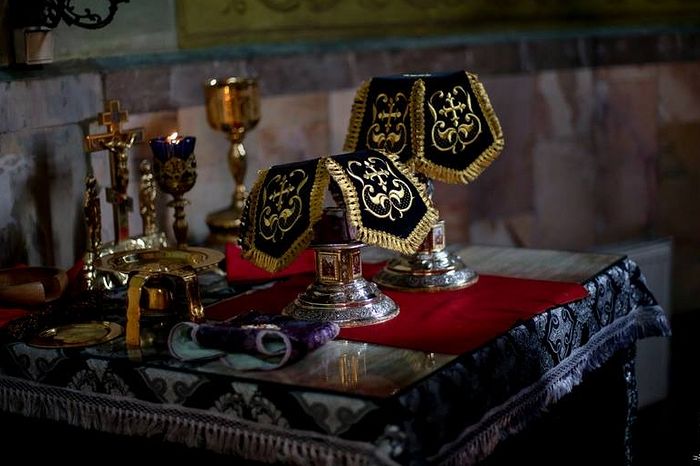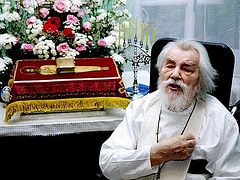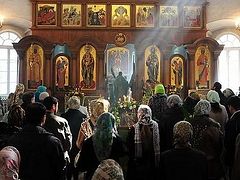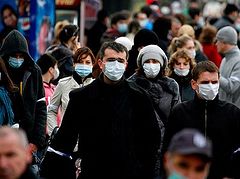We have received this letter from a Ukrainian bishop we are acquainted with, who wishes to remain anonymous…
The time that our generation of the members of the Russian Orthodox Church doesn’t remember is coming. Neither did our fathers and grandfathers know it. Though, as it seems, it will be just a short period, for some reason it is “covering” the spiritual “sky” with a frightening black “cloud”. Why so? Why did heaviness and despair appear in the hearts of many faithful with this quarantine? Maybe out of fear of catching this virus and not surviving it? No, the reason is different. Maybe out of the thought of finding themselves alone at home, with nothing to do, without the usual routines, without interesting jobs, active leisure-time and personal communication with friends? This version is wrong too. Modern people can find a substitution for this for weeks or even months. Maybe it is the fear of finding themselves without the means of subsistence for their families, without food, the prospect of losing their long-occupied positions? Although such thoughts may bother people, but they won’t shake the deep inner understanding of religious people that the Lord will sort things on earth out by His Providence and, as the saying goes, “as long as we’re alive we aren’t dead”—we know this by experience.
Then what is the source of such anxiety? Why are people so sad and heavy at heart?
There is an answer to this question, though not everybody has realized this yet. We may be separated from Christ. Without our beloved Lord Jesus Christ!
***
“Can it really be true?” some will argue. “Churches are still open, services are still held, and everybody can come provided that they observe simple sanitary regulations. And is it possible to separate us from Christ?” others will continue. Who shall separate us from the love of Christ? Shall tribulation, or distress, or persecution, or famine, or nakedness, or peril, or sword? neither death, nor life, nor angels, nor principalities, nor powers, nor things present, nor things to come, nor height, nor depth, nor any other creature, shall be able to separate us from the love of God, which is in Christ Jesus (Rom. 8:35, 38-39). There is no doubt that those who will repeat the words of the apostle will be right.
Then why the sorrow, heaviness and apprehension?
Because, my dears, we are used to living by Communion.
All of us, contemporary faithful of the Russian Orthodox Church, live by constantly taking Communion of the Body and Blood of Christ and can’t live otherwise. The very thought that there will be no Communion for some time is unbearable. This state of “being spoiled by indulgence” makes us different from our saintly ancestors—the New Martyrs and Confessors of the twentieth century. They were much stricter with themselves. They were real strugglers for piety from their youth as compared to us, believers of the early twenty-first century. By spiritual strictness with themselves and self-discipline, cultivated by the severity of their lives and the responsible rhythm of rare Holy Communion, our Orthodox predecessors could stand fast against slander, abuse, persecution and exiles of the Soviet era. They didn’t give themselves up to despair and unbelief beneath the weight of their cross. At the same time, they could carry Communion of the Body and Blood of Christ, which they might take very seldom, as a precious gift for many years of confession of their faith. Nothing was able to separate them from the love of God, which is in Christ (Rom. 8:39).
But we are different, my dear and close brothers in weakness and fellow sufferers. We are not like them. And the all-merciful and wise Lord knows us, Orthodox of our days. But, with all of that, He loves us very much. He gives Himself to us, weak as we are, in the Holy Gifts undeservedly often. He has taught us in the twenty-first century to live by taking His Body and Blood all the time, though it was not part of the practice of our Local Church in past centuries. He has taught and allowed us to live by the weekly miracle—sanctification, healing and change of our nature that suffers from sin. It is a miracle that each one of us sees in the fragile and impure vessel of the human soul, an undeserving and frequent miracle. It is a gift of God to us—weak, unfaithful and unworthy modern Christians. The Lord wants to save us together with our holy ancestors—the confessors of faith and strugglers for piety.
***
And now they want to take our Holy Communion, our Christ and Lord from us. Christ, Who alone gives us strength to live in this fearful and guileful world—a world of external dangers and inner passions. And it is this fear (of losing Communion of the Body and Blood of Christ) that is hanging over us like a black cloud. And even if we still don’t realize this, our souls already feel it, beginning to worry, feeling melancholy and miserable…
***
“But wait, where do you see this hazard?” someone will ask me again.
We already see it in Europe, in a number of Local Orthodox Churches, in the Western countries where our Church has a presence. This hazard has become reality there. Currently, there is no possibility for or extremely difficult for tens of thousands of Orthodox Christians to take Holy Communion. Ukraine’s turn is next.
At present many Ukrainian dioceses have to celebrate the Liturgy without the laypeople’s participation behind closed doors, after which the people are allowed in church in small groups of about ten for confession and Communion… The emergency situation that is “promised” by the media every day hasn’t been declared yet, but it may happen. Russia’s turn is probably next. After all, it is a pandemic… [In fact, this has already happened in Russia.—Ed.]
Some will argue: “It won’t last. These measures are for a month or two, for six months at most.”
But have you ever been parted with your love for six months? Or with your parents for a month or two at the age of five, especially if you were overprotected children? Then you will be able to understand what you are offering our faithful. Or maybe you once stayed alone in an impenetrable forest, face-to-face with wild animals and poisonous insects for a month or two without a tent, clothes and safety equipment? You haven’t? Then you will never understand how a believer feels when he stays absolutely alone with his passions for a month or two without the Body and Blood of Christ. You definitely don’t understand what you are talking about.
***
Dear laypeople of our Holy Orthodox Church, today I, a bishop of your Church, address my word of pain and sympathy to you on behalf of very many other bishops, priests and deacons who sympathize with you in your possible oncoming trials. We are representatives of the same generation and come from the same background. Together we took the first steps in the faith and were instructed by the same spiritual fathers, sharing the joy of the revival of our Church and took part in it as much as we could. We served and prayed together at the Liturgy, communed together, kept fasts together and rejoiced in the feasts together.
But today we all may find ourselves in different situations. However tight the quarantine (or emergency situation, or curfew) regulations that may befall us during this pandemic might be, for us clergy the Holy Gifts of Christ and other sacraments will always be available. We can celebrate the Liturgy at home, commune with the reserved Gifts, perform other sacraments for ourselves and our nearest and dearest. But for many of you, our brothers and sisters in Christ, the quarantine regulations may make access to both churches and the homes of priests impossible. Of course, it won’t be forever. But this may happen and you should be prepared for this. In some sense, it may serve as training for the Church before the horrible times described in the Apocalypse—may God keep all of us from living to see those days.
Today I address you, our dear people, with a word of compassion and hope. However strict the emergency regulations in the countries where the Russian Orthodox Church is present may be, we clergy will always seek any opportunities to help you, our laypeople, in spiritual life.
We will use every opportunity to ensure that you confess your sins and take the Holy Gifts of the Lord. We will do all in our power to convince the leaders of the countries we live in to give an opportunity to our faithful to participate in the grace of the holy sacraments. And where we won’t be able to change the situation despite our efforts, we will certainly pray for you all wholeheartedly in a brotherly manner so that the Lord will help you withstand and go through this difficult stage of your spiritual life without Communion.
Now we will probably have to go through an unprecedented time that no one has seen for ages. Even if it doesn’t last, it will teach us something. May God grant that our hearts respond to this lesson with a sincere love for each other, gratitude to God for the great gift of His Body and Blood and the awareness of the deep mystical unity of all the members of His Body: both laity and clergy.
With love and hope,
Bishop N.





